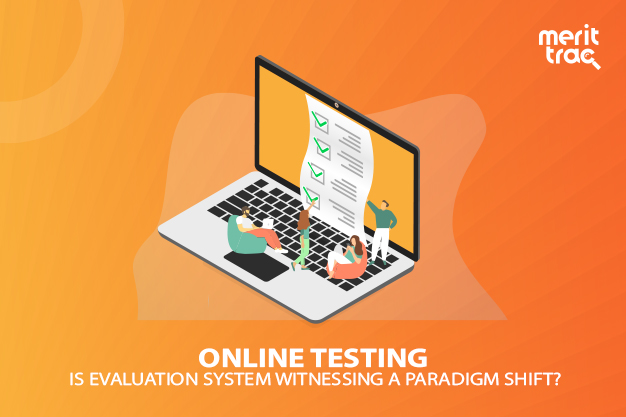
Online Testing – Is Evaluation System Witnessing a Paradigm Shift?
Date: 17/03/2020 | Posted by: Ajmal V, Content Strategist | Category: Digital Evaluation , Education , Online Examination
Online Testing – Is Evaluation System Witnessing a Paradigm Shift?
The modern examination is over a century old and it is imperative to get updated as technology plays a crucial role in education. The traditional classroom knowledge transmission is being evolved into advanced app-based learning. Moreover, online education is a fast-growing business in the world. Both universities and new institutions are providing online courses.
According to 2017 report of KPMG and Google, the e-learning in India is set to grow to $1.96 billion business and user base will reach 1.9 million by 2021. Early this year, the Central government approved the beginning of online degree courses only to open access to as many prospective students as possible. Accessibility is a key feature of online education.
While education becomes online, assessment and testing are also seeing this transformation. The examination process is adopting digital technology to witness the change from traditional assessment methods. Tech-enabled testing platforms reduces cost, time and efforts. It also helps to reduce errors and irregularities. Along with online education, the online examination is also becoming popular across the globe. Without any doubt, we can say that online testing is to be the future of assessment.
Online mode of exam opens many hitherto untouched possibilities like more reach and security, quick delivery, real-time grading and others. Let’s dig deeper into each possibility.
Reach and accessibility
Internet facility is the only requisite to conduct the online examination, that means candidates in remote areas can also take exams. Due to the location of centres or unpredicted circumstances like natural calamities and others, many talents miss or skip their paper-pen exams. The pervasiveness of online examination, on the other hands, let tapping the right talents.
Transportation of question paper and invigilators to and fro exam centres is a tiresome task in the examination process. Whereas Cost, time and efforts of logistics become nil in the online examinations. Once the questions are set, the students can participate in the exam from anywhere.
Agility
The traditional examination process is time-consuming. Pre and post-examination day, the authority has to undertake various preparations. Checking of answer sheets delay the declaration of results. It takes weeks or months to declare results in University-level exams because of the candidates' number. This issue becomes null and void in online testing since the platform allows real-time grading. The candidate can find the result upon completing the test if it is enabled. Quick revision of question is also done if anyone raises concern. Revaluation and rechecking could be an easy process.
Scalable
Preparation of test venue is another headache in the regular exam system. Seating arrangements and other facilities for the candidates and invigilators require human efforts for days. Under online assessment, these issues never arise as the candidates either attend the test at a prescribed centre on a given time or participate from own computer system by signing up to a particular website or software. Moreover, details such as attendance and performance can be obtained with few clicks. This allows institutions to minimalize their efforts by enabling to test a large number of candidates.
Enhanced security
Question paper leaks are the biggest crises in the examination process. Efforts and money spending for the safety and security of the question papers are huge. Secrecy is foremost in the preparation of question paper. Since all questions are encrypted in online exam mode, no one can peek into question paper and leak it in the entire process.
Reduce frauds in exam
Cheating is another concern in the traditional examination process. Candidates indulge in a wide range of methods to score with cheats including paper bits, copying from others, getting help from an outside source via electronic medium and impersonation etc. With personalised questions, remote proctoring system and others, online testing provides a foolproof mechanism to administer the exam. Each candidate may find different questions from others as the system automatically picks questions for each candidate. The advent of AI enables performance-based questions – test could be harder or softer based on the response of the candidate.
In advanced online testing platforms, the system collects biometric access while registration and use AI to verify the authenticity of candidates at the venue. Remote proctoring let invigilate the test through the web camera and video recording. This also enables the blocking of multiple window options in the computer.
As technology advances, the quality of life improves, and the standard of living gets expensive, sticking to the traditional way of conducting examinations is no longer viable. Technology is the only solution for this and online testing, as explained above, qualify to offset 100-plus years old paper-pen exams.
Handpicked Articles for Futher Reading
Relevant Case Studies/Whitepapers:














 Sales Hotline: USA: +1 646 916 0939 / Others: +91 80619 14700
Sales Hotline: USA: +1 646 916 0939 / Others: +91 80619 14700


